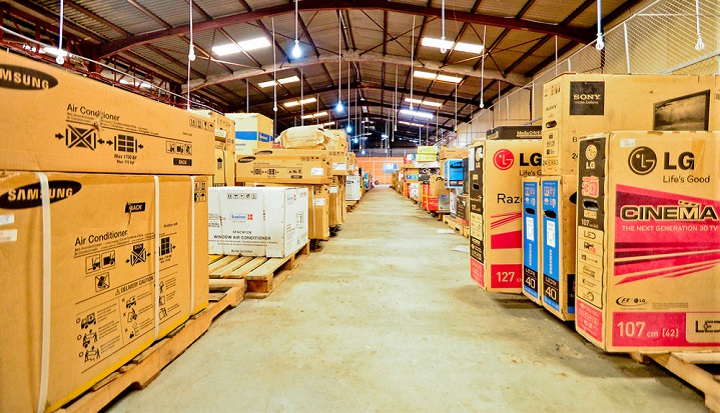Ololade Adeyanju/
Stakeholders in Air Cargo and logistics business have held discussions on how to mitigate the impacts on the Coronavirus pandemic and keep essential goods supply chains moving.
The COVID-19 pandemic and global lockdowns have challenged Africa’s air cargo and logistics stakeholders in recent weeks, but through collaboration, agility and the use of digital technologies, they are ably delivering on their mandate to supply critical goods.
This is according to industry players who participated in a webinar hosted by Logistics Update Africa, partners of air cargo Africa, the sector’s leading industry exhibition and conference, on how last-mile delivery services can keep up with Covid-19 demand for critical medical and food shipments.
Speakers from airports authorities, logistics solutions providers and e-commerce companies in Kenya, Nigeria and South Africa noted that adapting to the new realities of closed air lanes and new logistics restrictions had demanded agility and collaboration. However, the same collaboration and agility would serve the industry well when normalcy returns, they said.

With passenger flights grounded and only limited cargo flights landing, airports authorities in South Africa and Kenya said they were seeing a dramatic drop in activity at airports.
Nina Engelbrecht-Malherbe, Senior Specialist – Cargo at Airports Company South Africa, said traffic at OR Tambo international airport had dropped from around 650 movements per day to around 30 – 40 per day. “What’s keeping us busy is the essentials, and we are even seeing passenger aircraft now transporting essential goods in and out of airports, so the cargo precincts are still abuzz.”
Jacob Bwana, Commercial Manager – Cargo at the Kenya Airports Authority, said the pandemic had illustrated that air cargo and its associated logistics network was critical for both commercial and humanitarian purposes.
“A key lesson in this time has been the need for solid business continuity plans to mitigate risk and support stakeholders,” he said. On the question of increasing costs, he said: “Scarcity creates increasing prices, and increases the risk of spoilage, so this is unavoidable. However, we hope to see demand and supply coming back to equilibrium when we return to normalcy. A crisis is not a time to compete, but to collaborate to save lives.”
With reports indicating that air cargo capacity remains 35% lower than last year across all trade lanes around the world, global stakeholders and industry bodies have also emphasized the need for industry collaboration and communication. The International Air Cargo Association (TIACA) has urged the air cargo industry to collaborate to keep fueling trade and ensuring the supply of critical goods, while the International Air Transport Association (Iata) has called for greater coordination between governments to ensure that air freight can continue to flow.
Overcoming last mile challenges
While fewer flights mean the potential for increased efficiency in offloading and distribution of goods, lockdowns and restriction of movement have created bottlenecks and challenges for road freight and last mile players, the speakers said.
Among these challenges were compliance with new regulations that restrict movement across borders or during certain hours of the day. However, close collaboration and consultation with governments and value chains had helped to overcome last mile challenges.
Kagure Wamunyu, Chief Strategy Officer at Kobo360, said digital collaboration via Kobo360’s aggregation platform had enabled logistics services to maximize capacity and avoid delays that could have increased costs and slowed the delivery of essential goods. “For example, truck drivers could be required to go into quarantine for 14 days when crossing a border, so by sharing information and working together, companies can arrange for a local driver to take over at the border, to avoid the delay.”
Tolulope George-Yanwah, Country Manager – Nigeria at Jumia Services, said the current crisis was underlining the critical role e-commerce plays, and logistics has been its enabler. “Technologies offer a solution in times like these. As a tech-enabled company, the biggest changes for us have been the need to introduce contactless delivery and enhance precautionary measures. But because we already had the capacity to scale up for special promotional events, we are able to meet growing demand for essential goods. The lesson for everyone is the need to be flexible and react quickly to new situations.”
Suzette Scheepers, CEO of Messe Muenchen South Africa, organisers of air cargo Africa, says supply chains are more important than ever before. “We’re seeing just how important air cargo and the entire logistics chain is, as we strive to take essential medical supplies and food to countries battling the COVID-19 pandemic. They will be increasingly important in bolstering fragile economies in the months to come. We agree that collaboration and communication, as well as harnessing the most advanced models and technologies, will help the sector manage costs and improve efficiencies to keep it sustainable through this difficult time.”
Air cargo Africa, to be staged in Johannesburg from February 9 – 11, 2021, will bring together industry stakeholders from across the value chain to discuss the challenges, solutions and opportunities in a fast-changing market.
0






